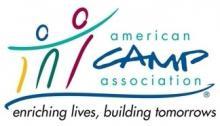
The American Camp Association (ACA) is a nonprofit organization with the mission of enriching the lives of children, youth, and adults through the camp experience. It is made up of camping professionals with a dedication to “preserve, promote, and improve the camp experience” for children, youth, and adults.1 They believe that organized camps provide lessons in character and skill development, healthy living, and community.
Founded to support the organized camping movement of the late 19th century and early 20th century, ACA had two beginnings: the Camp Directors Association of America formed in 1910 for male camp directors and the National Association of Directors of Girls' Private Camps (NADGPC) formed in 1916 for female camp directors. This latter organization soon broadened their membership beyond private camps and became known as the National Association of Directors of Girls' Camps (NADGC).
The two camp director organizations joined forces in 1924 and became the Camp Directors Association (CDA). As they struggled to serve the diverse needs of the young camping movement, the CDA evolved again in 1935 to become the American Camping Association. Seventy years later in 2005, they would become the American Camp Association.
From the beginning, ACA was focused on improving the organized camp experience by supporting the professional development of camp directors. Through the years they have also consciously chosen to avoid contact with any political or economic pressure groups as well as any commercialism.
Two years after the CDA formed, in 1926, their magazine Camping, later known as Camping Magazine, was launched. They also published the Sargent Handbook, a resource describing all the current summer camps. Besides hosting conferences, the CDA supported the institute series taught in 1930 by Dr. Hedley S. Dimock, the dean of the YMCA College in Chicago. This series explored the role camps provided in the character education of children and was widely attended by professionals in the Boy Scout and Girl Scout organizations, YMCA and YWCA organizations, social welfare entities, and private camp organizations.
After transitioning into the American Camping Association, in 1948 ACA coalesced the discussions of the 1930s and 1940s to form the ACA Standards, which became the accepted camp standards of the courts and government agencies.2 These nearly 300 standards are the basis for ACA camp accreditation and define what is a quality camp program. With the standards forming a commonality among the widely diverse camp organizations, ACA built a national office in Martinsville, Indiana in 1955.
Facing the issues of discrimination in post World War II America, ACA emphasized “intercultural, interracial, interclass, and interfaith camps as a means to build democratic character, tolerance, and acceptance of difference.”3 What began in 1945, however, didn't reach reality until the 1960s.
Other issues the ACA has faced through the years have been youth population fluctuation, economic recessions limiting camp enrollment, land price increases affecting camp acreage, the electronic age, high unemployment, and lengthier school calendars prescribing less time for experiential learning.4 They advocate on behalf of camp experiences’ positive outcomes in health and wellness, environmental stewardship, team building and leadership, workforce development, and academic enrichment.
Through grant funded research, ACA has studied the impact camp experiences have upon youth development. They found that “camp enables significant growth in confidence and self-esteem, relationship and friendship skills, and independence and responsibility” and that it “provides an environment with appropriate boundaries, structure and expectations, and hands-on learning opportunities – the building blocks for a successful life.”5
- 1. “About ACA.” American Camp Association. < http://www.acacamps.org/about/who-we-are > 3 Aug. 2012.
- 2. Yerkes, Rita. “His Story, Her Story, Our Story: 100 Years of the American Camp Association.” American Camp Association. < http://www.acacamps.org/campmag/issues/1001/his-story-her-story-our-story-100-years-american-camp-association > 3 Aug. 2012.
- 3. Leslie Paris, 2008 as quoted in Yerkes.
- 4. Ozier, Lance. “Camp: At the Crossroads of America's Past and Future.” American Camp Association. < http://www.acacamps.org/campmag/1207/camp-crossroads-americas-past-future > 2 Aug. 2012.
- 5. “Causes of Camp: Partnering with ACA.” American Camp Association. < http://www.acacamps.org/partnerships > 3 Aug. 2012.

